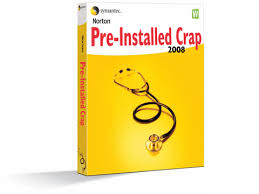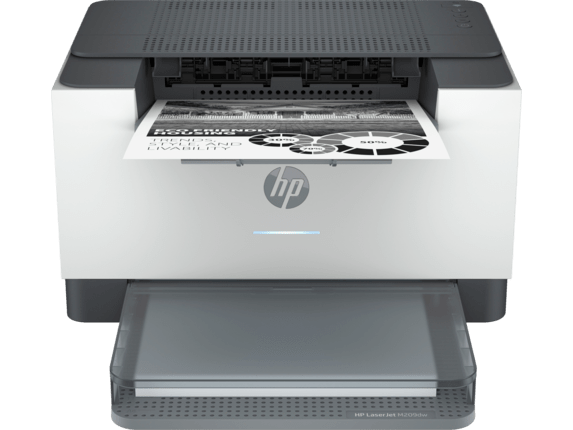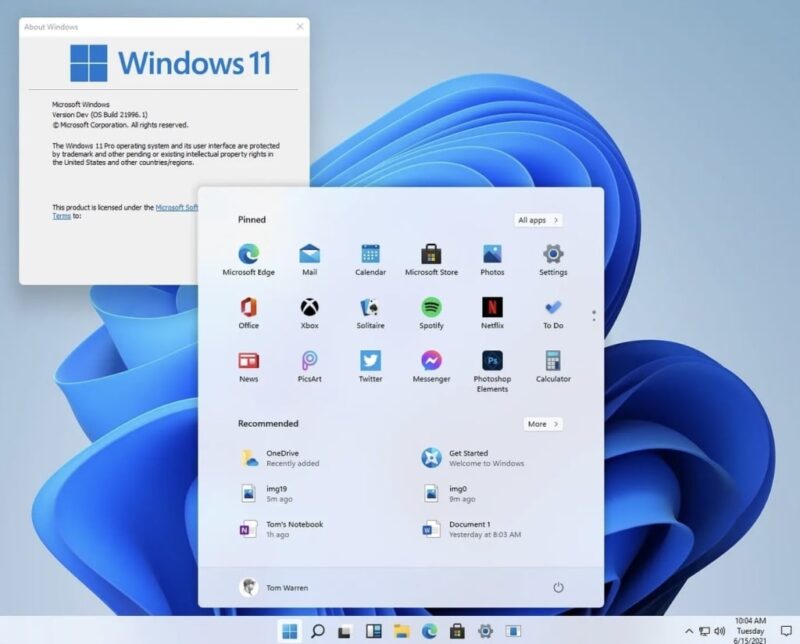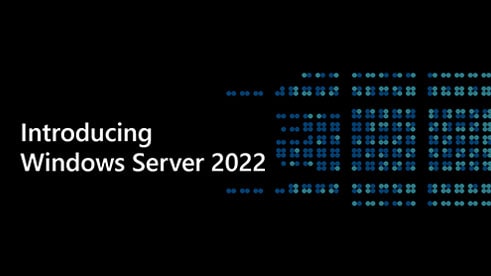You might have heard the expression: “Bloatware”, but what is it and why does we often find it on a brand new computer we just bought?
Definition of Bloatware
Well, let us start with the definition of bloatware also known as crapware. What is it and what does it cover? I have been looking around the Internet to find the best definition of the term: bloatware. With all the definitions, I have found around trusted sources on the Internet, here is my definition of the bloatware. Bloatware is free/trial software that often comes with a preinstalled computer. This software can be anything from a browser plugin, a DVD burner program, to a security program. Sometimes it is a full featured program and sometimes it is trial version of some software that you need to pay for after 30 – 60 days. On example of Bloatware, that I often see is Symantec Security software in some kind of time-limited version. I really hate their security software solution and they can be very difficult to remove completely even for a professional IT guy like myself.

Does Bloatware harm my computer?
The short answer to this question is no! Bloatware is not virus or malware so in that case it does not. Yes, I know, Lenovo had a bad case back in February 2015, with some preinstalled computers that actually was shipped with malware, but normally it does not harm your computer. The long answer is that if you don’t need this software or don’t know that it exist, it does take up a lot of resources on your brand new computer. It slow up the start-up time of your computer and it fill up on your hard drive. It might also affect your programs start-up time or make them unresponsive.
Why is there Bloatware on my new computer?
Now that we have clarified, what bloatware is and that it not normally is dangerous to your computer, I will tell you the true about why it is installed on your brand new computer? The reason is that competition on the PC market is very hard and all tricks are used to sell computers as cheap as possible and cheaper than the other hardware vendors, to win market share on the PC market. On way to keep the price low, is to get software vendors to pay a small fee to get their software preinstalled. It can be trial versions or free versions with limited functionality with the possibility to upgrade to a premium version to unlock advanced features. Actually, it seems like all the big vendors use this trick to keep the price on their computers as low as possible. Vendors like HP, Acer, Lenovo and Dell, use this trick to keep the price down. I believe it is a shame, that this has become normal practice for the big vendors, because most end users does not know about this and down now how to deal with this.

How do I remove Bloatware on my new computer?
Doing my research for this post, I came across a website with the catchy name decrap.org On this website you can download a little tool that helps you remove unwanted bloatware. The tool is free and there is a little video on their site explaining how to use the tool.
What do you think?
I would love to hear what you think about this bloatware issue? Is it something we just have to accept or should the big vendors stop pre-installing all this crapware? Would you be willing to pay more for a computer with a clean Windows installation? Please drop me a comment below and tell me what you think.





It’s surprising how much bloatware you get on new computers, I removed loads of stuff off my new laptop when I first booted it up, certainly made a heck of difference in the performance.
Exactly my point Karen. It can sometimes take hours to remove all the junk they ship new computers with these days.
Nice article Thomas,
I think bloatwares are not limited to computers. they could be anything like smartphone app, wordpress plugin or even a simple php function that keep using your server resources while you dont need it at all. Take a look at Samsung’s Galaxy phones for example, they come with tons of preinstalled apps that can be downloaded from the playstore. For an advanced user, he can simply root his phone and then remove the uneeded system apps or just freeze theme with an app like Titanium backup. But for an average user, he will just live with that.
Hi Asmi
You are absolutely right. New modern Smartphones from companies like Samsung and HTC are full with bloatware that many of us would like to remove. In many cases you will have to root the phone to get rid of it. That is one of the reason why I bought a Google Nexus 5 phone last November. It is a nice clean Android install without all the crapware most phine comes with today.
Hello Thomas,I am a computer geek but this is the first time I have heard of this bloatware. I also tried some other sites for its definition but the way you represented it is awesome. I was nervous that whether it affects my system or not. But, as you explain it, I don\\\’t think it will.Thanks for sharing this information.
Hi Rohit
It is not dangerous in any way, but if you don’t need it or use it, you might want to uninstall it, to make your system run more smooth.
Thank you i find it irritating to uninstall all junk program especially when the time i bought my new laptop and when i try to use those program it only ask me to buy license first before i use there program that i only use for the first day so i think its better to remove those junk program.
Hi John
It is for sure better to remove that kind of software if you don’t use it anyway. You might also want to run some kind of registry cleaner afterwards. The uninstaller programs often leave a lot of junk behind.
Its funny to know that this is the first time i have ever heard of these bloatware thing.Nver knew such thing existed in Pc until u pointed it out.
Hi
Not only does it exist, it is almost standard if you buy a new computer from one of the big brands like Dell, Lenovo or HP.
I removed loads of stuff off my new laptop when I first booted it up, certainly made a heck of difference in the performance.
Hi Jason
It does for sure make a big difference. To bad it has to be that way with a brand new computer.
Talk about coincidence. Started reading your article and first thing I see is NORTON’s. I had to refresh my PC after the recent NIS update trashed hundreds of files. NIS couldn’t even restore many of them – just said path unknown. Luckily I have file backups but it was actually easier to just refresh and re-install stuff. Going to implement a scheduled image backup plan now. Will never use Norton’s again.
Thanks.
What are the most common difference between bloat wares then form virus
Virus is something that have a destructive purpose. Bloatware is often software that wants you to by more software or something preinstalled that you don’t actually need on a brand new computer. Bloatware is preinstalled on the computer from the hardware vendor.
Ok sir thank you for responding, so bloatware have nothing to do with harming your PC.
The preinstalled app on our Android phones that are useless too are blot wares?
Yes, we see a lot of this on many phones too and some of the apps are not even possible to uninstall. That is why I like the Google Nexus phones that comes with a clean Android installation.